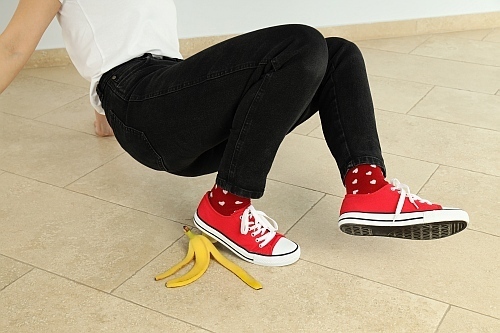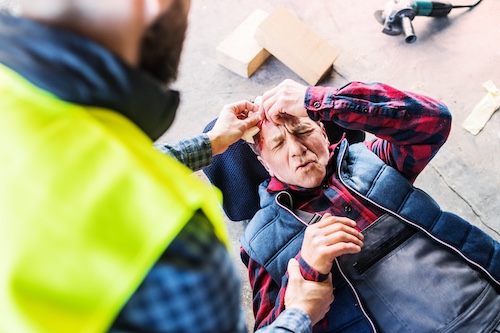Understanding Slip and Fall Accidents in North Carolina – Common Causes and Legal Considerations
Slip and fall accidents can lead to minor injuries like sprains or bruises, but can also result in serious conditions such as head injuries, broken hips, or spines. In this blog post, we will delve into the legal aspects related to slip and fall accidents in North Carolina.
A slip and fall accident refers to a situation where an individual slips, trips, or falls due to unsafe or hazardous conditions present on another person’s property. It’s a common type of personal injury case. These accidents can be caused by things like:
- Wet or uneven surfaces
- Poor lighting
- Cluttered walkways
- Defective sidewalks or stairs
- Exposed cables or wires
How to Prove a Slip and Fall Accident Case in North Carolina – Legal Insights and Premises Liability
Slip and fall accident cases revolve around the concept of “premises liability.” This refers to a property owner’s legal responsibility for accidents and injuries that occur on their property.
In a slip and fall case, the injured person (the “plaintiff”) must prove that the property owner (the “defendant”) was negligent. This means showing that:
- You were legally on the property and the property owner had a responsibility to ensure your safety.
- A hazardous situation existed on the property.
- The property owner was or should have been aware of the hazardous situation and its potential to cause harm.
- The property owner failed to take appropriate measures to rectify the situation or provide a warning about it.
- You suffered injuries as a direct result of the hazardous situation.
- You incurred financial losses due to your injuries, such as medical expenses, loss of earnings, or other damages that can be legally recovered.

Understanding How North Carolina’s Slip and Fall Accident Laws Impact Your Case
The laws surrounding slip and fall accidents in North Carolina can be complex. Here are some crucial aspects to know.
Contributory Negligence Rule: How It Affects Your Personal Injury Case
North Carolina’s contributory negligence law makes the situation more complicated than it might be in another state.
North Carolina follows a pure contributory negligence standard. You can only recover damages for an injury if the court finds that you didn’t contribute to any portion of the injury. This rule is strictly applied in most personal injury cases, including slip-and-fall accidents.
If you play a role in causing an accident, your ability to receive compensation from a liability claim may be compromised. Any disputes regarding negligence might ultimately need to be settled in a court of law. The rule of thumb is simple: if the plaintiff is even 1% at fault for an accident in the state of North Carolina, then they may not recover damages.
Why Time Matters: Deadline to Sue for a Slip and Fall Accident
According to North Carolina General Statutes section 1-52, a civil lawsuit for “any injury to the person or rights of another” must be filed within three years. This statute of limitations applies to the vast majority of slip and fall lawsuits in North Carolina.
Workplace Slip and Fall Accidents: What You Need to Know
Under North Carolina law, you are generally barred from filing a lawsuit against your employer following a workplace accident that led to injury. However, there are certain exceptions to this rule. For example, if your employer neglected to secure the mandatory workers’ compensation insurance, you may have the right to initiate a civil lawsuit against them.
FAQ
1) Who Is Liable Or At Fault For Slip And Fall Accidents And Injuries
OverviewOfPremisesLiabilityLaw
In North Carolina, a slip and fall accident is generally handled under premises liability law. Under this legal framework, the property owner or occupier owes a duty of care to everyone legally on the premises—invitees, licensees and even some trespassers. If that duty is breached through negligence and results in a fall injury, the owner may be held liable for damages.
ElementsToEstablishNegligence
To prove fault in a slip and fall case, an injured party must show:
- Duty of Care: The property owner or occupier had a legal obligation to keep walkways, floors and stairs safe.
- Breach of Duty: A hazardous condition existed—such as a spill, broken tile or icy patch—and the owner failed to clean, repair or warn.
- Causation: The dangerous condition directly caused the slip or trip and the resultant injury (e.g., broken bones, spinal cord trauma).
- Actual Damages: The victim suffered measurable losses, including medical bills, lost wages and pain and suffering.
CommonResponsibleParties
Although most slip and fall claims target the property owner or landlord, liability can extend to:
- Business owners who control maintenance (retail stores, restaurants, offices)
- Tenants with exclusive control over certain areas (leased spaces)
- Contractors or maintenance companies tasked with repairs or cleaning
- Government entities responsible for public sidewalks or municipal facilities
- Manufacturers of defective flooring or safety equipment (in rare cases)
KeyConsiderations And Next Steps
- Notice of Hazard: Liability hinges on whether the owner knew—or should have known—about the unsafe condition and failed to address it in a reasonable time.
- Comparative Doctrines: North Carolina’s contributory negligence defense may bar recovery if the injured party is even slightly at fault.
- Evidence Gathering: Photographs of the hazard, incident reports, witness statements and maintenance records strengthen a fall accident claim.
- Legal Representation: An experienced 1Charlotte attorney will document your injuries, assess damages and pursue maximum slip and fall compensation on your behalf.
For a free, 24/7 consultation with our personal injury lawyers in Charlotte, Raleigh, Durham or Asheville, contact 1Charlotte today. We stand ready to evaluate your fall accident claim and guide you through every step of the premises liability process.
2) How Can A Personal Injury Lawyer Help With Slip And Fall Injuries?
Case Assessment
At 1Charlotte, our first step in any slip and fall accident claim is a thorough investigation of the scene. We:
- Examine flooring, lighting, signage and other unsafe conditions
- Compare findings against North Carolina premises liability standards
- Identify hazardous property conditions that caused your fall
Proving Liability
Establishing fault in a slip and fall lawsuit requires demonstrating negligence. We:
- Show that the property owner knew—or should have known—about the danger
- Document failures to repair, replace or warn guests of impending risks
- Address contributory negligence defenses that insurers may raise
Evidence Collection
Strong proof is critical in a fall injury case. Our team gathers:
- Photographs of ice, debris or structural defects
- Witness statements and surveillance footage
- Expert testimony on building codes and safety norms
Insurance Negotiation
Insurance adjusters often devalue or deny accident slip and fall claims. 1Charlotte:
- Handles all communications to prevent lowball offers
- Presses carriers for full coverage of medical expenses, lost wages and pain and suffering
- Leverages detailed damage calculations to support maximum compensation
Legal Process Guidance
Navigating a falling accident claim can be complex. We guide you by:
- Filing all required documents and meeting court deadlines
- Managing settlement discussions or preparing for trial
- Explaining every step so you focus on recovery, not paperwork
Dedicated Representation
With 24/7 access to our attorneys and free consultations, you gain:
- Personalized attention—no case number, only you
- Aggressive advocacy from investigation through verdict
- Peace of mind while we pursue the full damages you deserve
Contact 1Charlotte for a no-cost review of your slip and fall accident case. Let our experienced personal injury lawyers secure the compensation you need.
3) Can I Claim Compensation For Damages After A Slip And Fall Accident?
Establishing Liability Under Premises Liability Law
To recover damages after a slip and fall accident, you must prove that the property owner or responsible party:
- Owed you a duty of care to maintain safe conditions (e.g., clear walkways, non-slip flooring).
- Breached that duty by allowing hazards—wet floors, broken tiles, ice patches—to persist.
- Caused your injuries, whether broken bones, spinal cord trauma, or soft-tissue harm, by their negligence.
Gathering Evidence To Support Your Accident Claim
Strong documentation distinguishes a successful slip and fall case from a loss. Key evidence includes:
- Accident reports and inspection records noting unsafe conditions.
- Photographs of the trip hazard, ice, or debris.
- Witness statements confirming how the fall occurred.
- Medical records detailing symptoms, diagnoses, treatment, and ongoing therapy.
Recoverable Damages In A Slip And Fall Lawsuit
Once causation and liability are established, you may seek:
- Economic damages: medical expenses, rehabilitation costs, lost wages, and out-of-pocket expenses.
- Non-economic damages: pain and suffering, emotional distress, loss of enjoyment of life.
Contributory Negligence And North Carolina Law
North Carolina follows a strict contributory negligence rule. If the defense proves you share any fault for your accident—even 1%—you may be barred from recovery. A skilled slip and fall lawyer can help minimize allegations of shared fault and protect your right to compensation.
Next Steps: Acting Quickly And Seeking Counsel
Statutes of limitations in North Carolina typically give you only a few years to file a premises liability accident claim. Contact 1Charlotte for a free consultation—available 24/7—to:
- Evaluate your slip and fall injury case.
- Advise on gathering further evidence and navigating negotiations.
- File a complaint or lawsuit when settlement talks stall.
With aggressive representation and personalized service across Charlotte, Raleigh, Durham, and Asheville, we help slip and fall victims secure full compensation for their injuries and losses.
Injured in a Slip and Fall Accident in North Carolina? Contact Ross Moore Law for a Free Personal Injury Consultation
If you’ve been injured in a slip and fall accident on someone else’s property, taking immediate action is crucial for securing compensation. 1Charlotte Injury Lawyers recommends following these steps to protect your rights:
-
Seek medical attention: This creates written documentation of the incident, which will be useful later in your case.
-
Report your injury to the property owner: This is essential for filing a personal injury claim.
-
Photograph the scene: Take photos of the area where the injury occurred and any visible injuries to support your claim.
-
Contact a personal injury lawyer: A skilled lawyer, such as those at 1Charlotte Injury Lawyers, will fight for the compensation you deserve. While many cases settle, your attorney will be ready to represent you in court if necessary.
If you were injured in a slip and fall accident, contact 1Charlotte Injury Lawyers today for a free consultation. We’ll work diligently to ensure your rights are protected and that you get the compensation you deserve. Don’t wait—let us guide you through the legal process and fight for justice on your behalf (704) 706-2689




